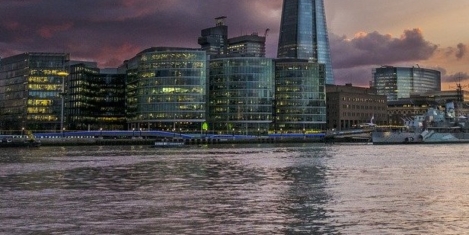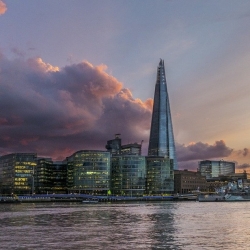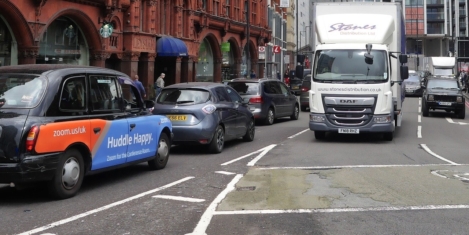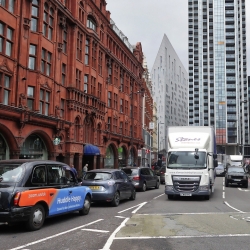To provide the best experiences, we use technologies like cookies to store and/or access device information. Consenting to these technologies will allow us to process data such as browsing behaviour or unique IDs on this site. Not consenting or withdrawing consent, may adversely affect certain features and functions.
The technical storage or access is strictly necessary for the legitimate purpose of enabling the use of a specific service explicitly requested by the subscriber or user, or for the sole purpose of carrying out the transmission of a communication over an electronic communications network.
The technical storage or access is necessary for the legitimate purpose of storing preferences that are not requested by the subscriber or user.
The technical storage or access that is used exclusively for statistical purposes.
The technical storage or access that is used exclusively for anonymous statistical purposes. Without a subpoena, voluntary compliance on the part of your Internet Service Provider, or additional records from a third party, information stored or retrieved for this purpose alone cannot usually be used to identify you.
The technical storage or access is required to create user profiles to send advertising, or to track the user on a website or across several websites for similar marketing purposes.
 According to new government figures, the country’s digital sector contributed £149 billion to the UK in 2018, accounting for 7.7 percent of the economy. This is up 7.9 percent on the previous year, meaning growth in the sector is nearly six times larger than growth across the economy as a whole, which increased by 1.4 percent. (more…)
According to new government figures, the country’s digital sector contributed £149 billion to the UK in 2018, accounting for 7.7 percent of the economy. This is up 7.9 percent on the previous year, meaning growth in the sector is nearly six times larger than growth across the economy as a whole, which increased by 1.4 percent. (more…)






 Executives in small and mid-sized businesses in the UK are more anxious about major decisions at work than critical decisions at home that affect their family, a new study has claimed. The new study by
Executives in small and mid-sized businesses in the UK are more anxious about major decisions at work than critical decisions at home that affect their family, a new study has claimed. The new study by 


 Three-quarters of UK employees who have experienced a mental health condition believe stigma around the issue has reduced over the past year but the vast majority would still not discuss their condition with their line managers, according to new research. Aviva’s “Health of the Workplace” report, released for Time to Talk Day, suggests that just 9 percent of employees who have had a mental health condition sought help from their line manager, 12 percent would discuss their condition with a work colleague and only 4 percent would talk to HR.
Three-quarters of UK employees who have experienced a mental health condition believe stigma around the issue has reduced over the past year but the vast majority would still not discuss their condition with their line managers, according to new research. Aviva’s “Health of the Workplace” report, released for Time to Talk Day, suggests that just 9 percent of employees who have had a mental health condition sought help from their line manager, 12 percent would discuss their condition with a work colleague and only 4 percent would talk to HR. 
 ‘Touch base’ and ‘no-brainer’ are apparently the most loathed pieces of office jargon in the UK, with ‘outside the box’ and ‘go the extra mile’ following closely behind. According to a survey of 2,000 people by Premier Inn, almost one in five people say they can’t stand one of these four pieces of corporate speak.
‘Touch base’ and ‘no-brainer’ are apparently the most loathed pieces of office jargon in the UK, with ‘outside the box’ and ‘go the extra mile’ following closely behind. According to a survey of 2,000 people by Premier Inn, almost one in five people say they can’t stand one of these four pieces of corporate speak. 


 Nearly two-thirds of financial services leaders expect to be mass adopters of AI in two years compared to just 16 percent harnessing it today, a
Nearly two-thirds of financial services leaders expect to be mass adopters of AI in two years compared to just 16 percent harnessing it today, a 
 Senior employees being too confident about the value of their ideas could be one reason businesses are failing, according to research by the University of Cologne. The study, conducted by Professor Fabian Sting and a team of interdisciplinary co-authors, highlights how choosing the wrong ideas to pursue can lead businesses to make unwise investments and miss out on opportunities, which could threaten their survival. A large part of the problem, it says, is that the person who comes up with the idea overestimates how successful their innovation will be and views their skill or performance as better than it actually is.
Senior employees being too confident about the value of their ideas could be one reason businesses are failing, according to research by the University of Cologne. The study, conducted by Professor Fabian Sting and a team of interdisciplinary co-authors, highlights how choosing the wrong ideas to pursue can lead businesses to make unwise investments and miss out on opportunities, which could threaten their survival. A large part of the problem, it says, is that the person who comes up with the idea overestimates how successful their innovation will be and views their skill or performance as better than it actually is. 


 Outdoor workers in the capital are exposed to 15 percent more pollution than the average Londoner, new
Outdoor workers in the capital are exposed to 15 percent more pollution than the average Londoner, new 
 More than 600 business and HR leaders gathered at London’s Hilton on Park Lane on 30 January 2020 as the
More than 600 business and HR leaders gathered at London’s Hilton on Park Lane on 30 January 2020 as the 







February 5, 2020
Bridging the gap between the reality and perception of engagement
by Callum Gill • Comment, Flexible working, Technology, Workplace